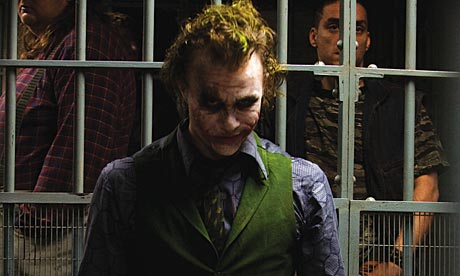Had one of those sweet “ah-ha” moments as I was watching the closing scenes of “Batman: The Dark knight”.
I went something like this: “Oh, I get it! He’s the good guy who’s willing to play the bad guy in order to be the good guy. Harvey Dent was the ‘white knight’ of Gotham. Batman is the ‘Dark Knight’ of Gotham!”
Having had a friend in my youth who was a huge fan of Batman comics, especially the “Dark Knight” renderings of Bob Kane’s original character by artist Frank Miller. I never caught the irony of the title, though now it seems totally obvious now. I don’t know if the comic series intended the irony in the same was as the film did, but it is delicious regardless of origin.
In addition to exploring (inadvertently) the moral implications of post-modernism through the character of the Joker, I’ve also been hungry to examine the film’s commentary on moral ambiguity as seen through the hero, Batman.
Batman is a bit of an anti-hero, meaning that he is flawed. I think that we are drawn to anti-heroes because we identify with them easily; they are more like us. Bruce Wayne finds himself caught in a nasty ethical dilemma in that the Joker is having his way with the people of the city that he loves and wants to protect. The only way he can help the people he loves, says the Joker, is to surrender himself. The dilemma is this: the people’s only protection is that they forfeit their only protection. It is an un-winnable scenario and the Joker moves to force a response by increasing the violence.
The Joker’s violence seeks only to morally corrupt his opponents in his criminal chess match, to show that evil is inherit in everyone. In the case of Harvey Dent, District Attorney of Gotham and proclaimed ‘white knight’ of the people, the Joker wins. Dent is corrupted. While ultimately defeated, the Joker scores a victory. Without blathering on about the plot, by the end of the film we see that the hero concedes that he must resort to immorality in order to stop his enemy. The immediate comparison is to the Patriot act and the invasion of privacy in the name of the ‘greater good’. The subtext runs far deeper.
The crime-fighting tactics of Batman reflect the title of the film. The films resolves Bruce Wayne’s ethical dilemma by excusing evil in the name of pursuing the greater good. Inadvertently, the film accepts defeat in its victory statement.
Here’s the gist of my argument: In the film, the Joker is the only one who has his morality in line with his beliefs about truth and human nature. He accepts the implications of relativism. Since he’s abandoned his moral compass (like everyone else in the film and in real life) he explores the depths of his depravity and seeks to force others to look in the same ugly mirror. He knows that relativism plus the depravity of man yields nothing more than anarchy.
 Bruce Wayne, on the other hand, tries to uphold order without the aid of objective truth. His character implies relativism, and yet he fights to be free of it’s consequences. This is like trying to steer between Scylla and Charybdis. In order to keep order he is force to do wrong. As a force of human government, Batman is trying to hold human depravity in tension with the need for order. These are two forces that DO NOT go together. Governments in our world have to do this all day every day.
Bruce Wayne, on the other hand, tries to uphold order without the aid of objective truth. His character implies relativism, and yet he fights to be free of it’s consequences. This is like trying to steer between Scylla and Charybdis. In order to keep order he is force to do wrong. As a force of human government, Batman is trying to hold human depravity in tension with the need for order. These are two forces that DO NOT go together. Governments in our world have to do this all day every day.
Biblically this fits the model of Romans 13:4, stating that government bears the sword against evil. Groups of people, motivated by mutual self-interest, hold the impulsive nature of sin in check in the name of protecting their long-term, mutual interests. The problem is for the film, though, that the need for government is itself an acknowledgment of the depravity of man. The real irony of the film is that while it seeks to salvage the nobility and goodness of man from post-modernism, it surrenders its key point in the process.
Pardon my pontificating. You can all go back to enjoying your popcorn soon. I just feel that this film reflects and deepens the way people think about themselves and the world. It may prove to be a watermark as we look at the shifting fronts of the war on truth. To have a hero who is considered the hero because he was willing to engage in evil is not an idea that is often explored in popular culture. No doubt the justifications for doing evil will spread like an ink stain.
There is more to be said on the role of government in this world. To think on all the different forms of government and their assumptions about the nature of truth and the nature of man is fascinating to me. I hope it is to you as well.



